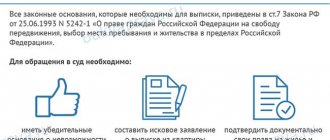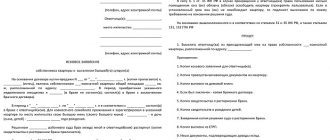Alexey BessonovPracticing Moscow lawyer
Hello. I am a visiting lawyer from the Bessonov and Partners law firm. I specialize in discharging citizens in court.
Any person can be discharged without his consent only if there is a court decision to do so - clause 1 of Art. 35 Housing Code of the Russian Federation and paragraphs. 5 (f) clause 31 of Government Decree No. 713 of July 17, 1995. The only thing you care about is going to court. There is no other way out.
The removal of a minor child from a municipal apartment by court is the most difficult situation of such cases, because the law and the judicial system initially take the side of children and protect their rights and interests well. There are many more conditions, nuances and differences here than when discharging an adult. You will see this below.
Conditions for discharging a child with examples
There are chances for a positive outcome of the case only when ALL OF THE FOLLOWING CONDITIONS are met. After them, be sure to read the examples for better understanding. Let's start:
- A child can only be discharged together with the parent with whom he is registered. Only the child's court will refuse to do this. The exception is when he is initially registered without a parent, but this happens extremely rarely with municipal housing.
In this case, it does not matter: 1) Whether the child’s parent is the employer/main tenant - clause 2 of Art. 69 Housing Code of the Russian Federation. 2) The degree of relationship between the child and his parent with those citizens who want to discharge them. Kinship plays a role only when extracting from private property.↓
- FROM THE MOMENT OF REGISTRATION of the child, neither he nor the registered parent entered the apartment at all or lived in it . If at least one of them lives in the apartment for a week after registering the child and proves this in court, the child and parent will not be discharged. Even if after a week's stay they then move out and live in another home for 10 years. Then there are two ways: 1) Try to discharge only the parent now, and the child after he reaches adulthood. This can be done because the registration of a child does not give “immunity” when his parent is discharged. Instructions - how to discharge an adult from a municipal apartment. 2) Or try to discharge the parent along with the child after reaching adulthood. The instructions are the same as in the first case.↓
- The total period of non-residence of the parent in the apartment is at least 3 years. For example, a parent moved out of the apartment in November 2021, and he registered his child in March 2021. A claim for their discharge can be filed as early as November 2021, i.e. 3 years from the date of departure of the parent.
The period of non-residency of 3 years is not prescribed either in the law or in any Supreme Court Order. This period is applied by the courts in practice, i.e. it was determined by me and my colleagues who participate in the courts for the discharge of citizens. Plus, we have read quite a few similar court decisions.↓
- The parent left the apartment at least 3 months before the child’s registration . Ideally within half a year. This period is determined by judicial practice, although it is not indicated in official documents.↓
- The parent does not pay utilities for at least 3 years - similar to the minimum period of non-residence that was indicated earlier.↓
- The parent and child do not live in the apartment on a permanent basis , not temporarily. For example, a girl who is registered in a municipal apartment, immediately after the birth of her child, undergoes long-term treatment in the hospital, and therefore did not move into the apartment. And the child lives with his father at a different address. In this situation, the child and mother cannot be discharged if she left the apartment less than 3 years ago. We always remember the minimum period of non-residence.↓
- The parent left voluntarily and did not try to move back in. For example, a parent left due to conflicts with others registered, or he and his child were simply not allowed to live. Or the registered parent is in prison, and the child lives with the other parent in another place. If this is proven in court, they will not be discharged.↓
- The parent himself does not have the right to discharge his child , i.e. be an initiator in court. Even if the child has never moved into the apartment and the parents are divorced.
Example No. 1: Three people are registered in a municipal apartment - spouses Vladimir and Elena, as well as their adult son Ivan. In January 2021, Ivan got married and voluntarily left the apartment, but did not check out. Also, from the moment he leaves, he does not pay utilities. In March 2019, his daughter was born, whom he immediately registered in his municipal apartment. Ivan and his daughter never moved into the apartment after she registered. The rest of those registered have a chance to be discharged, but they can file a claim at least 3 years from the date of Ivan’s departure - in January 2021.
Example No. 2: Sergey and Olga are registered in a municipal apartment. Now they are ex-spouses. Divorced in March 2015. That same month, Sergei voluntarily left the apartment and stopped paying utilities. He later married again and had a son, whom he registered in a municipal apartment in December 2021. But they did not move into the apartment. Olga has a chance to write them out. She could have filed a claim in December 2021, because from the moment the child was registered, Sergei had not lived in the apartment for more than 3 years.
Example No. 3: Andrey and his sister Svetlana are registered in the apartment. She got married and voluntarily left the apartment in May 2014. She then had a son, whom she registered in September 2017. At the same time, she and her son moved into a municipal apartment and lived for 3 months, then moved out again. Andrey has very, very little chance of discharging his sister’s son (his nephew), because the child has lived in the apartment, albeit for a short time. The point is how convincingly the sister can prove in court that she lived with the child for 3 months in 2021.
Ivan will have a better chance of discharging only his sister. You need to wait at least 3 years for her non-residence, i.e. he can file a claim in September 2021.
Example No. 4: Daria and her son Timur are registered in the apartment. In February 2013, he got married and voluntarily moved out of the apartment. After the birth of his daughter, he registered her in the apartment in April 2015. He did not try to move in with the child, but since 2021 he periodically pays a small part of the utility bills himself. The last payment was in January 2021. It will not be possible to discharge either the child or the parent, because he pays utility bills and will be able to prove this in court.
Legal advice on registration in a municipal apartment
It is necessary to register my spouse in a municipal apartment, the main tenant is my mother, in addition to my mother, her husband (my father), daughter (my sister), and a minor child (my sister’s daughter) live in the apartment. I previously lived in this apartment, now I am registered in another. My wife has consent for registration of all living adult family members. The area of the apartment is 64 sq.m. It is necessary to register for subsequent privatization, which we are going to do through an agency (the technical passport is already ready). The problem is this: the social tenancy agreement was concluded on January 27, 2005 for a period of five years (i.e. until January 27, 2010). The Federal Migration Service requires the consent of the landlord to move in and renew the contract. Question: is it necessary to re-conclude the contract, since it takes a month to complete (and my wife and mother and I don’t have time to wait, we need to fly to Moscow)? Where should we apply for the landlord’s consent and how much time does he need to decide? Everything is complicated by the fact that we came to the one-window service in Omsk at Gagarin, 32/1, the informant said that the contract was not concluded with them, and the mother does not remember where she did it. The address is not indicated in the contract, it only says: “housing sector of the Central Administrative District of Omsk ).The apartment was obtained under a warrant in 1983, for a woman with food, who had been checked out long ago. The plane was leaving on 10/13/2012, what should I do? Thank you in advance!
We recommend reading: One address, different cadastral numbers
How to act. I am the owner of one of the rooms (No. 1) in a three-room apartment. lived and was registered in a one-room apartment, taken out on a mortgage. with the birth of the child, it became extremely crowded in a 14-meter room and it was expensive (to pay contributions for my husband’s salary, you yourself understand what the amount of child benefit is), considering options for improving our situation, we sold the apartment and bought a second room (No. 2) in my communal apartment - extreme))) , but residential 14 meters +16.5 meters is super for a family (almost a two-room apartment, as we laughed), but the fly in the ointment is the neighbors. it wasn’t just dirty, I can’t describe to you how they trashed the apartment in the three years that I didn’t live there (I rented out my room to them, then I had to throw everything out of it), there were so many cockroaches that I bought a room for a guy from a cat, they crawled in in the ears, nose. the cats found everything, and considering that the floors (windows..) were washed last. once in 2009, when I moved out (when I lived there, I bored them with my cleaning) and when they found out that I bought a second room and would live with my family, they expressed a desire not to live with me))) they sold it to me (for which I counted). now the point. room (No. 3) is not privatized, with debts of 120 thousand rubles. + penalty 50t.r. + electric power 17t.r. + gas 7t.r. (as I found out, not a penny has been paid since 2007) a 46-year-old man (recidivist) and his 15-year-old son (disabled, something like mild debility) are registered. lived as a family + cohabitant (registered in the next entrance in the municipal apartment with mother and grandmother) + daughter 12 years old (disabled retard, registered with her mother and registered only in the name of her mother) + son 10 years old (recommendation of a psychologist this year correction class, registered with mother ).When I started making renovations on my space, I stopped renting out my room, they already felt cramped in their 12-meter room and the “wife” and daughter went to live at their place of registration, in the next entrance, and we began the privatization procedure, but at the moment After receiving a certificate from the BTI, we stood up: they had made a redevelopment (instead of a built-in closet opening into the corridor there is now a door to the room, and the previous entrance is blocked, accordingly the footage of the room has changed to the area of the closet), which was recorded by a technician upon entering our apartment at sale of rooms 1 and 2. BTI cannot give a certificate, it is necessary to legalize the redevelopment (and this takes time and money). During privatization, the Labor Committee needs to explain why the footage of the room changed from 12.3 to 12.7. As an option, return everything to its place, since that closet is in the hallway. but then they brought the pension, they washed it down and it became completely useless for them to do this, they won’t rearrange anything. Now he (the man) is hiding from me, because I demand compensation for the money spent on privatization, he said that he would give it back, but he doesn’t work anywhere, and the family’s only income is the children’s pension. Now they pretend that they don’t even come into the apartment, but I notice and see that someone came. I don’t live there yet (renovations + public places are terrible). gave an application to the fire department (the vestibule was cluttered, that at the entrance there was 40 cm on the floor to enter) a man came, I don’t know what he told them, but everything was still the same))) children were hanging out unattended (there were arrests at night without adult accompaniment) no one do not care. I want to write a statement to the guardianship authorities. also addressed to the head of the administration of our district, TK, I don’t understand why everyone is inactive. go to an appointment with the head, talk about why parasites use the house and are not even going to pay (as they say: they won’t evict a disabled child anyway), and now they don’t even live there, then the district administration, as the owner, should participate in the current repairing the common area. What do you advise, how do you see this situation? Is it possible to register a disabled person with his mother (she also has public housing, especially since she is her son’s trustee, receives a pension for her son and an allowance for caring for a disabled person), and evict the father for debts?
We recommend reading: Calculation of sick leave if the employee did not work one previous year for this employer
Legal justification of the conditions
Now I will explain as simply as possible why and on the basis of which articles of law the above conditions appeared. Where relevant, I will paste the full text of the article and highlight relevant words. If you are not interested, you can move on to the next section.
About the parent . In order to discharge an adult from a municipal apartment (in our case, the child’s parent), the court must recognize that the parent has LOST the right of use (residence). Clause 3 of Art. comes to our aid. 83 of the Housing Code of the Russian Federation - “If the tenant and members of his family leave for another place of residence, the social rental agreement for residential premises is considered terminated from the date of departure.”
The Supreme Court, in paragraph 32 of its Resolution, listed the circumstances under which this can be done: 1) A person does not live in an apartment for a long time - paragraph 3 of Art. 83 Housing Code of the Russian Federation. 2) Doesn’t pay utilities from the moment of leaving, although he is obligated on the basis of clause 3 of Art. 67 and paragraphs. 2 and 4 tbsp. 69 Housing Code of the Russian Federation. 3) Left on a permanent basis, not temporarily - Art. 71 Housing Code of the Russian Federation. 4) Left voluntarily, and not forced - clause 2 of Art. 1 Residential Complex of the Russian Federation.
By the above actions, it becomes clear to the court that the parent HIMSELF REFUSED his right to use the apartment, which means he can be recognized as having lost this right and discharged.
Now about the child . Everything is more complicated here. Clause 2 art. 20 of the Civil Code of the Russian Federation - “The place of residence of minors is the place of residence of their legal representatives - parents, adoptive parents or guardians.” Simply put, from the moment of birth a child has the right to live with his parents or with one of them. In our situation, he automatically has the right to use the municipal apartment in which either of his parents is registered.
A child, due to his age, does not determine where to live. This is determined by his parents - Art. 54, art. 55 and art. 63 RF IC. Since a child cannot fully exercise his housing rights (determine his place of residence), he cannot himself lose the right to use a municipal apartment. Therefore, the child cannot be recognized as having lost this right.
In order to discharge a child, the court must recognize that he has NOT ACQUIRED the right to use, but not because he does not live in the apartment. The logic here is different. Parents have the right to move in/register their minor children with them - clause 2 of Art. 20 Civil Code of the Russian Federation, clause 1, art. 67 and art. 69 Housing Code of the Russian Federation. But if the parent himself lost the right to use a municipal apartment at the time of registration of the child (I wrote about this above), then he did not have the right to move in/register him - clause 3 of Art. 83 and paragraph 1 of Art. 67 Housing Code of the Russian Federation. In this case, the child does not acquire the right to use. Therefore, he can only be discharged with one parent.
If a parent, after registering a child, at least once moved into an apartment and lived for a while, this shows that he has not renounced his right to use and the apartment is his place of residence. In this case, the child automatically acquires the right to use. Or a child acquires the right when he moves into an apartment - with or without a parent. Therefore, the child cannot be discharged in these situations. Only after he comes of age.
How to discharge a child from an apartment with the consent of the parents?
If the child’s parents agree with his removal from the apartment, then deregistration is carried out on a voluntary basis.
If a child is under 14 years old, parents can remove him from the register. If the child is 14 years old, then with the consent of the parents, the child can deregister himself by submitting an application in person.
Deregistration can be made by submitting an application for registration at a new place of residence or an application for deregistration at the place of residence.
To deregister, you must submit one of the above applications. You may also need to submit the following documents along with your application:
- birth certificate or passport (if over 14 years old) of the child
- identification documents of legal representatives, guardian
- document-basis for the child's placement
- consent of the second parent to move in the child
Can't do without a lawyer
If all of the above conditions are met, this increases the chances by only half. If not less. The main difficulty in court is that EVERYTHING NEEDS TO BE PROVED IN WRITING. The judge will not believe the words. Especially when the rights of the child are affected.
Written evidence is certain certificates and acts from various government departments and organizations. An ordinary citizen will not be able to obtain most documents because he does not have the status and authority to do so. More precisely, he can make a request, but they will not answer it, because they are not obliged to. A lawyer will come to the rescue. He, having a special status, will make inquiries about organizations - paragraphs. 1 clause 3 art. 6 and paragraph 5 of Art. 6.1 Federal Law of May 31, 2002 No. 63-FZ. Organizations are required to respond to requests from lawyers, otherwise they face a fine - Art. 5.39 Code of Administrative Offenses of the Russian Federation.
A lawyer will study your situation and make inquiries to those organizations that are beneficial to you. From the received answers, he will select the most useful ones. I indicated which organizations you need to contact in the instructions below.
In addition to collecting evidence, the hired lawyer will collect and legally competently draw up all the necessary documents (statement of claim, etc.), will participate in court for you and protect your interests, and will build a correct and advantageous position of behavior.
If you do not contact a lawyer, you can ask the judge to gather evidence. The judge will issue the requests, but will ask you to take them to the organizations, and then pick up the answers to them. He will ask, because... can't force it. You will not have the opportunity to postpone requests that are more profitable for you. And you won’t be able to filter the responses received either. You won't know most of the answers because they will be sealed in envelopes. All this greatly reduces your chances of winning your case.
The most important thing is that it is much CHEAPER to hire a lawyer and at the same time have a better chance in court than to give away your share later when privatizing the apartment. In the future, you can buy back the share if the owner agrees to sell it. In any case, it will cost more than the services of a lawyer.
Our law office "Bessonov and Partners" offers residents of Moscow or the region. We will take on all the possible work - we will draw up a correct statement of claim, collect all the necessary documents and submit them to the court. You will not need to come to court hearings; the office's lawyer will participate in them and will do everything possible to win the case. At the end of the trial, we will bring you a copy of the court decision.
We have been working in the field of court records since 2008 and have won 84% of court cases.
The cost of the service is 90 thousand rubles. For visitors to this site there is a discount of 5% to 10%. To receive it, say that you came from the website “Prozhim.com”. For all questions and for a free consultation, call 8 (495) 642-31-96 (daily from 9:00 to 21:00 Moscow time / only for residents of Moscow and the region).
Execution of decisions on eviction and deregistration of children
After the court decision on eviction has entered into force and there has been no voluntary action to evict children from the home, the plaintiff must apply to the court to obtain a completed copy of the court decision on entry into force and a writ of execution to evict the children.
The writ of execution must be presented to the bailiffs to initiate proceedings and take action to forcibly evict children from the occupied residential premises. It is unlikely that an eviction order will only affect children as children are typically evicted with their parents, so bailiffs will work with the children's legal representatives to notify them of the eviction. In the absence of voluntary actions to leave the residential premises, persons together with their children will be forcibly evicted.
In order to discharge minors from housing, a court decision must be presented to the registration authority, on the basis of which the children will be discharged.
About the residential address of the child and parent
During consultations, I am always asked a similar question: “I don’t know where the child and his parents live now. What address should I include in the statement of claim then? And if I know, then indicate their actual address?”
The defendant's residential address is his registered address. This is the position of the Supreme Court, described in paragraph 63 of the Resolution of June 23, 2015 N25. Therefore, in the statement of claim, we indicate the address of residence of the child and parent as the address of the municipal apartment from which they need to be discharged. They are written in it. The plaintiff has no obligation to know their actual address.
As a result, all court summonses will be sent to them at the address of the municipal apartment - Art. 113 Code of Civil Procedure of the Russian Federation. If they do not receive them (they do not live there), the court will still consider them notified. Any citizen is required to receive important correspondence, and parents/guardians do this for children. Therefore, the law is observed here. If they do not appear in court, the claim will be considered without their participation - clause 4 of Art. 167 Code of Civil Procedure of the Russian Federation. This benefits the plaintiffs because the defendants will not be able to protect their interests.
How to file a claim to evict a child?
The claim for eviction is drawn up in accordance with the requirements of Art. 131 of the Code of Civil Procedure of the Russian Federation, the text of which must contain the following information:
- name of the district court in which the lawsuit will be filed
- information about the plaintiff, namely, full name, address, telephone number
- information about the defendant, i.e. about the child, his full name, residential address, date and place of birth, as well as information about his legal representative, information about other defendants indicating their full names and addresses. date and place of birth, place of work, one of the identifiers (TIN, SNILS, etc.)
- the document will be called a statement of claim for eviction
- The most important thing in preparing a claim is the correct and clear presentation of all the circumstances of the case, the plaintiff’s motivation for his claims, including legal argumentation
- the pleading part of the claim must contain a clearly formulated demand for the eviction of a specific child from a specific residential premises
- the claim must be accompanied by written evidence, which must be listed in the appendix
- at the end the claim must be signed by the plaintiff
USEFUL : see more tips on filing a claim, and also order a ready-made version from our lawyer
Help from a housing lawyer in Yekaterinburg
The circumstances that make it necessary to evict a child from a home can be very different and the courts do not always make the same decisions, seemingly under similar circumstances.
By contacting the lawyers of our Law Office “Katsailidi and Partners”, you can count on:
- consultation on the issue of eviction of a child, taking into account your circumstances
- conducting mediation procedures with the participation of both parents or potential plaintiff and defendant
- preparing a lawsuit for eviction
- representing the client's interests in court
- request for additional evidence to be presented to the court
- appealing a court decision
- obtaining a court decision and writ of execution and presenting them to the relevant authorities for the eviction of the child and deregistration
- provision of other legal assistance in relation to the issue of eviction of a child
Please note that the truth can be both on the side of the plaintiff and on the side of the defendant. Our lawyers represent the interests not only of persons wishing to evict children, but also the interests of children and legal representatives who act in the interests of minors.










